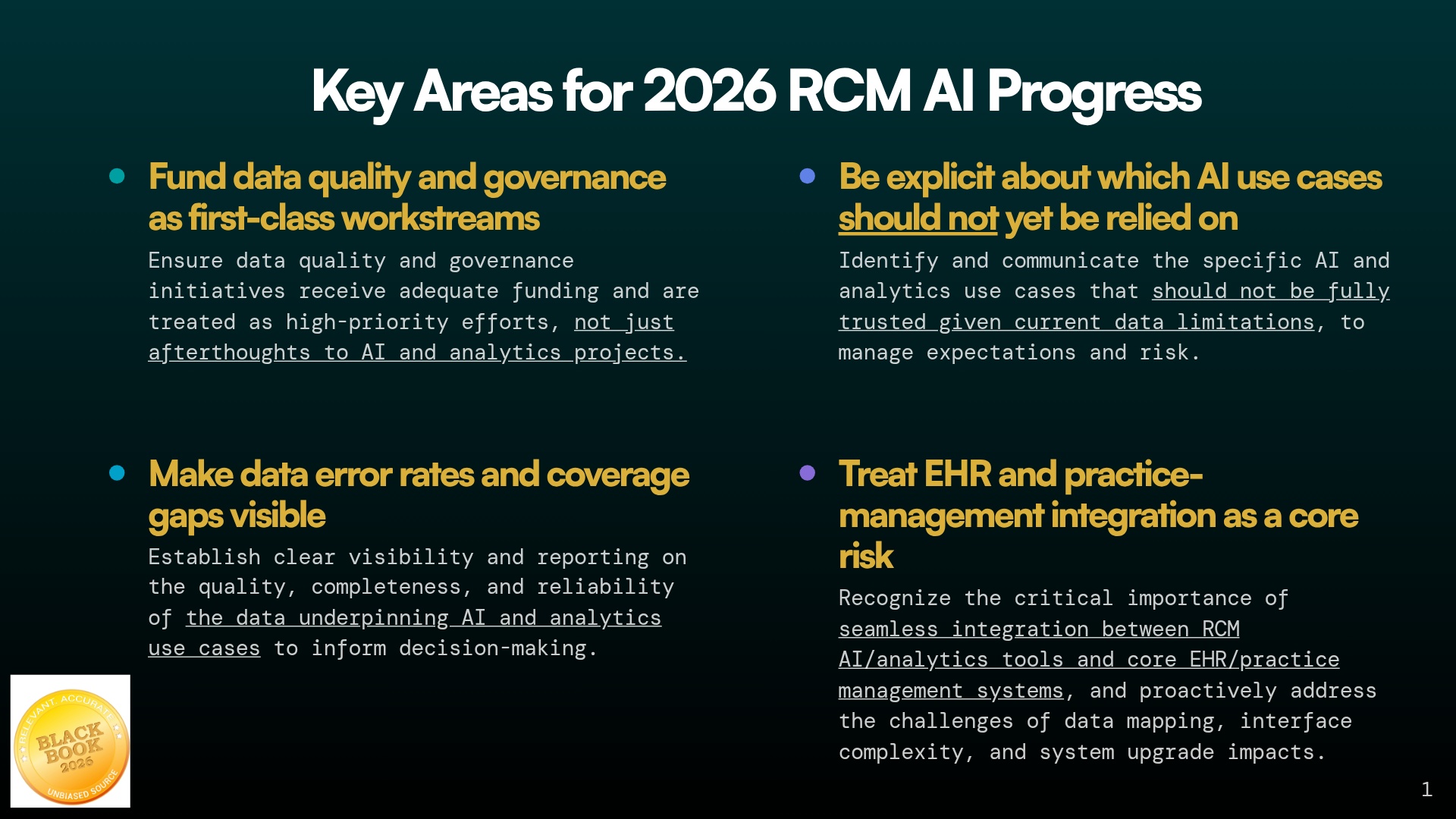149 revenue cycle executives report data quality, documentation, and EHR integration as the real constraints on AI-not algorithms or tools in Black Book Flash Poll
CHICAGO, IL / ACCESS Newswire / November 20, 2025 / As conference stages and strategy decks spotlight rising investment in AI, advanced analytics, and revenue cycle modernization, a new Black Book flash survey of 149 US revenue cycle leaders finds that data quality, governance, and integration remain the primary barriers to realizing those ambitions.
The poll, conducted November 1-11, examined how frontline revenue cycle teams experience AI and analytics in practice, specifically, how "garbage in / garbage out" issues affect adoption, trust, and impact.
"Most of the industry conversation today is about what AI could do in the revenue cycle," said Doug Brown of Black Book Research. "What RCM leaders are describing is something much more basic: they're still fighting inconsistent documentation, incomplete data, and fragile integrations. The models exist, but the foundations underneath them are not where the roadmaps and slide decks assume they are."
Key findings from the Q4 Black Book flash survey
Data quality is the top barrier to AI in RCM.
74% of revenue cycle leaders say poor data quality is a significant or critical barrier to successful use of AI and analytics, citing coding inconsistencies, missing fields, and timing issues in charge data and documentation.
Technology partners focus on capabilities more than foundations.
More than half (60%) of respondents say their major RCM and analytics partners avoid or gloss over data quality problems in joint initiatives. Only 20% feel these partners address data quality well or very well.
Data governance is underfunded compared to AI tools.
For AI and advanced analytics projects:
66% report that RCM data quality and governance work is unfunded or minimally funded, while budgets concentrate on tools, licenses, or models.
Just 14% say data governance is built into every AI/analytics project or supported by a standing program.
AI use cases are being throttled from within.
Nearly 4 in 5 organizations have held back at least one AI/analytics use case because they don't trust the underlying RCM data. The most frequently constrained use cases include:
Denial prediction and preventable denial analytics
Underpayment detection and contract compliance analytics
Propensity-to-pay and patient financial scoring
In many organizations, these capabilities exist on paper, but frontline teams are reluctant to rely on them for core workflows.
Documentation reflects payment rules more than reality.
69% of respondents agree that clinical and financial documentation in their systems is shaped more by reimbursement and compliance requirements than by clinical or operational reality. That raises direct questions about how well typical RCM datasets represent what actually occurred in an encounter, and by extension, about the validity of AI built on those datasets.
EHR and practice-management integration remains a structural drag.
76% rate integration between RCM AI/analytics tools and core EHR/EPM systems as a major or severe challenge, pointing to interface complexity, data mapping issues, and breakage during system upgrades.
Strategy narratives vs. operational starting point
Recent IT outlooks and investment reports have highlighted robust plans for AI-enabled revenue cycle transformation, with organizations prioritizing automation, advanced analytics, and new data platforms over the next several years.
Black Book's flash survey suggests that RCM leaders are starting from a very different place day to day:
Strategy materials emphasize future-state capabilities under the assumption of reliable, well-governed data streams.
RCM executives describe current-state conditions in which inconsistent documentation, missing data, and brittle integrations frequently undermine the same AI use cases being promoted.
"What we're hearing from revenue cycle leaders is not resistance to AI," Brown added. "They're saying the next wave of progress will come less from adding more algorithms and more from doing the unglamorous work on data quality, governance, and integration. Until that's addressed, the risk is that AI becomes another promise that doesn't match the reality on the RCM floor."
The survey highlights several areas where revenue cycle leaders believe progress is most needed:
Funding data quality and governance as first-class workstreams rather than afterthoughts
Making data error rates and coverage gaps visible and routinely reported
Being explicit about which AI use cases should not yet be relied on given current data conditions
Treating EHR and practice-management integration as a core risk and dependency, not a secondary technical detail
Black Book conducted this flash survey November 3-11, 2025 among 149 US revenue cycle, finance, and IT leaders with direct accountability for revenue cycle operations or technology. Respondents represented hospitals and health systems of varying sizes and regions. For statistical framing, the sample is treated as a panel representing approximately one thousand US hospitals currently using AI or advanced analytics in revenue cycle management. Under that assumption and simple random sampling, the results carry a maximum margin of error of approximately ±7.4 percentage points at the 95% confidence level.
Black Book Research is an independent healthcare research and consulting organization specializing in crowdsourced satisfaction, adoption, and experience data on healthcare technology and services. Black Book surveys thousands of healthcare and financial stakeholders annually to provide unbiased insight into market realities, emerging trends, and customer experience across the healthcare ecosystem.
For more information, please contact: research@blackbookmarketresearch.com
To download complimentary healthcare RCM industry surveys, visit: https://www.blackbookmarketresearch.com
Contact Information
Press Office
research@blackbookmarketresearch.com
8008637590
SOURCE: Black Book Research
View the original press release on ACCESS Newswire



